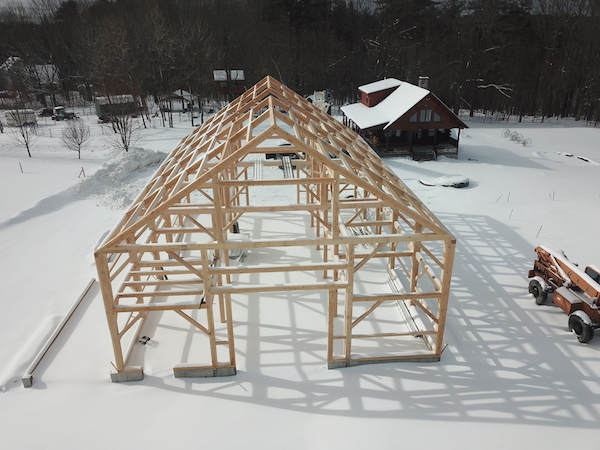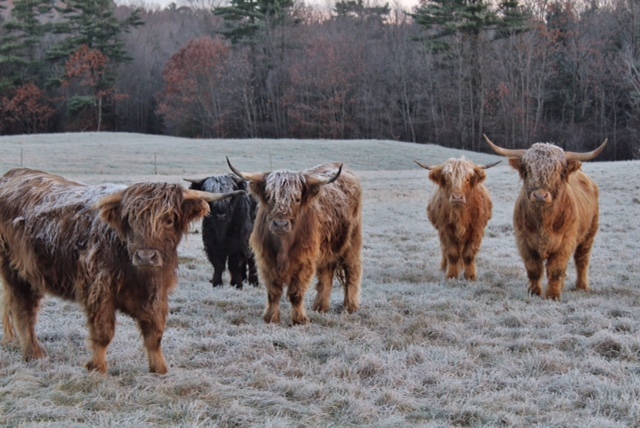A large new barn rises out of the late March snow and mud on Flaggy Meadow Road. Nearby a small herd of long-horned cows with shaggy coats bask in the early spring sun. “I have admired classic old barns all my life,” said Stephanie Cressey, owner of Little River Highlands. To fulfill her dream, she found a builder who designs and erects new timber frame barns using traditional joinery methods and techniques.
Scott Campbell has been taking down, restoring, and reassembling old post and beam barns for 20 years. This new structure is made of pine, hemlock and oak. Campbell did all the hand work in his Fryeburg shop, Maine Mountain Post and Beam.
“The frame design and joinery for the 40’ by 60’ gable entry barn are historically correct,” Cressey said. There are no metal fasteners; it was put together with pegs. Following a construction method originating in the 13th century, Campbell built with traditional English tying joints and jowl posts. It took Campbell and his crew two days to get the structure up using a crane from Shaw Brothers. Dennis Nickerson, of Affordable Builders in Gorham, is doing the finishing.


A towering post and beam barn went up over the winter at Little River Highlands. The “historically correct” barn will house the farm’s Scotch Highland cows.
Topped by a cupola, the barn is scheduled to be completed by summer and eventually will house a shop, craft room, and hay loft. There will be a side entry for Cressey’s Scotch Highland cows, although, she explained, even in winter they prefer to be outside.
Nearly as rare in southern Maine as a new post and beam barn, Highland cows were first imported to the United States from Scotland in the 1920s. Today, there are 17 farms listed in the Maine Highland Cattle Association. Cressey bought six heifers in 2017; six have been born since. Her one bull is registered.
Highlands are prized for their ability to withstand cold weather. Their colorful shaggy appearance comes from two coats of hair; one keeps out the rain and snow, the other keeps the cow warm. They can be auburn, white, black, or beige. Although Highlands average a hefty 1,600 pounds, they are known for being docile, calm, and not easily stressed.
Beef from Highlands is lean, high in protein and low in fat. Cressey brushes her cows and calls them by name, but she intends to sell some to help finance the farm. “Our cows are like pets and we treat them the best we know how while they are here,” Cressey said as she gave one a carrot. She has sold two already. “It was an easy choice,” she said. “The ones we are not able to brush or work with go; the one that breaks through a fence goes.”
Stephanie Cressey manages Cressey Apartments for her grandfather, but she makes time for her cows, other farm animals, a garden, and nature photography. “The farm,” she said, “is run by myself and my partner of 12 years, Greg Keene.”
Little River Highlands is not yet open for business but Cressey hopes to be by this fall. “We always welcome visitors to see the cows,” she said, “and to see the new barn, although once it is covered all the beauty will be on the inside.”


